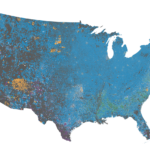An undocumented immigrant is defined by many scholars as a foreign-born individual without possession of proper documentation, often trespassing the U.S. without inspection upon entry.
In a new study by the University at Buffalo, a research team claims that, aside from the initial act of criminality of deviating from federal immigration laws or breaching any terms they may have been subjected to, there is no strong correlation between undocumented immigration and criminality. The study appeared in the Journal of Crime and Justice.
The assumption was made after examining estimates for the 2014 undocumented foreign-born population in U.S. metropolitan areas derived from three credible sources: the US-based think tank Pew Research Center, the Migration Population Institute, and the 2011-2015 American Community Survey data from the U.S. Census Bureau.
“Findings are consistent across all estimates of metropolitan undocumented populations,” Robert Adelman, and his colleagues, stated in their findings.
“Net of relevant covariates, we find negative effects of undocumented immigration on the overall property crime rate, larceny, and burglary; effects in models using violent crime measures as the outcomes are statistically non-significant.”
“Although the results are based on cross-sectional data, they mirror other research findings that immigration either reduces or has no impact on crime, on average, and contribute to a growing literature on the relationship between immigration and crime,” the authors of the study concluded.
In short: the results are vague and not representative of such people residing in the U.S., particularly given that no reliable size of the undocumented population exists.
Although past studies have delved into the topic of immigration and crime, probing the undocumented population is complex and more evidence is likely needed to back such assertions.


